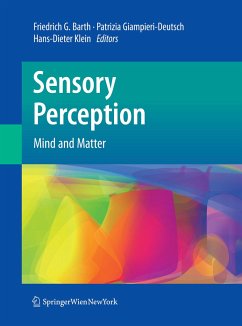Sensory perception: mind and matter aims at a deeper understanding of the many facets of sensory perception and their relations to brain function and cognition. It is an attempt to promote the interdisciplinary discourse between the neurosciences and psychology, which speaks the language of cognitive experiences, and philosophy, which has been thinking about the meaning and origin of consciousness since its beginning. Leading experts contribute to such a discourse by informing the reader about exciting modern developments, both technical and conceptual, and by pointing to the big gaps still to be bridged. The various chapters provide access to scientific research on sensory perception and the mind from a broad perspective, covering a large spectrum of topics which range from the molecular mechanisms at work in sensory cells to the study of the unconscious and to neurophilosophy.
From the reviews:
"This book explores the current research on sensory perception and links between animal and human studies. ... The obvious audience is neuroscientists, but it certainly also includes those in a variety of disciplines, including psychology and neuropsychology, as well as psychiatry, neurology, and philosophy given the final section of the book. ... there are colorful, good quality illustrations, as well as diagrams, charts, and models throughout. The references are generally up to date, but also include relevant seminal contributions." (Christopher J. Graver, Doody's Review Service, December, 2012)
"This book explores the current research on sensory perception and links between animal and human studies. ... The obvious audience is neuroscientists, but it certainly also includes those in a variety of disciplines, including psychology and neuropsychology, as well as psychiatry, neurology, and philosophy given the final section of the book. ... there are colorful, good quality illustrations, as well as diagrams, charts, and models throughout. The references are generally up to date, but also include relevant seminal contributions." (Christopher J. Graver, Doody's Review Service, December, 2012)








